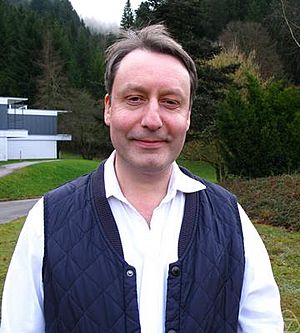Keith Martin Ball facts for kids
Quick facts for kids
Keith Ball
FRS FRSE
|
|
|---|---|

Ball in 2009
|
|
| Born |
Keith Martin Ball
26 December 1960 New York City
|
| Alma mater | Trinity College, Cambridge |
| Awards |
|
| Scientific career | |
| Fields |
|
| Institutions |
|
| Thesis | Isometric problems in lp̲ and sections of convex sets (1986) |
| Doctoral advisor | Béla Bollobás |
Keith Martin Ball, born on December 26, 1960, is a brilliant mathematician. He is a professor at the University of Warwick in the United Kingdom. From 2010 to 2014, he was the scientific director of the International Centre for Mathematical Sciences (ICMS).
Contents
Education and Early Life
Keith Ball went to Berkhamsted School when he was younger. Later, he studied at Trinity College, Cambridge, a famous university. There, he focused on a special mathematics course called the Cambridge Mathematical Tripos.
He earned his first degree in mathematics in 1982. Then, in 1987, he completed his PhD, which is a very high university degree. His research for his PhD was guided by a professor named Béla Bollobás.
What Keith Ball Studies
Keith Ball's work is in different areas of mathematics. He studies functional analysis, which looks at functions and spaces. He also works on discrete geometry, which deals with shapes and spaces in a different way, often involving many dimensions.
Another important area he researches is information theory. This field helps us understand how information is measured and sent. He has also written a book called Strange Curves, Counting Rabbits, & Other Mathematical Explorations. This book helps explain complex math ideas in a fun way.
Awards and Special Recognitions
Keith Ball has received many important awards for his work. In 2012, he was chosen as a Fellow of the American Mathematical Society (AMS). This is a big honor for mathematicians in America.
In 2013, he became a Fellow of the Royal Society (FRS). The Royal Society is one of the oldest and most respected scientific organizations in the world. Being a Fellow means he is recognized as one of the top scientists.
His award citation mentioned that his work has greatly influenced two math fields: functional analysis and information theory. It also noted that he helped show how the central limit theorem in probability is like the second law of thermodynamics. In 2023, he was also elected as a member of the Academia Europaea, another important academic group.
Images for kids
 | Precious Adams |
 | Lauren Anderson |
 | Janet Collins |


